天津高职升本大学英语考试大纲
专升本考试大纲英语
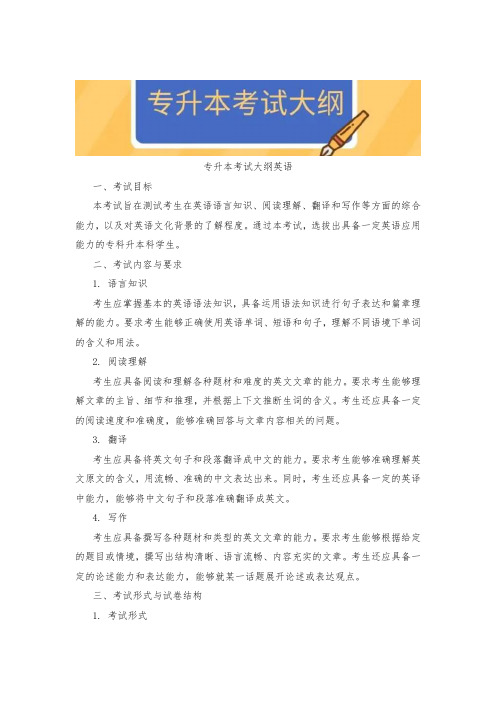
专升本考试大纲英语一、考试目标本考试旨在测试考生在英语语言知识、阅读理解、翻译和写作等方面的综合能力,以及对英语文化背景的了解程度。
通过本考试,选拔出具备一定英语应用能力的专科升本科学生。
二、考试内容与要求1. 语言知识考生应掌握基本的英语语法知识,具备运用语法知识进行句子表达和篇章理解的能力。
要求考生能够正确使用英语单词、短语和句子,理解不同语境下单词的含义和用法。
2. 阅读理解考生应具备阅读和理解各种题材和难度的英文文章的能力。
要求考生能够理解文章的主旨、细节和推理,并根据上下文推断生词的含义。
考生还应具备一定的阅读速度和准确度,能够准确回答与文章内容相关的问题。
3. 翻译考生应具备将英文句子和段落翻译成中文的能力。
要求考生能够准确理解英文原文的含义,用流畅、准确的中文表达出来。
同时,考生还应具备一定的英译中能力,能够将中文句子和段落准确翻译成英文。
4. 写作考生应具备撰写各种题材和类型的英文文章的能力。
要求考生能够根据给定的题目或情境,撰写出结构清晰、语言流畅、内容充实的文章。
考生还应具备一定的论述能力和表达能力,能够就某一话题展开论述或表达观点。
三、考试形式与试卷结构1. 考试形式考试采用闭卷、笔试形式。
考试时间为120分钟,满分100分。
2. 试卷结构- 语言知识:20分,占比20%;- 阅读理解:40分,占比40%;- 翻译:20分,占比20%;- 写作:20分,占比20%。
四、考题示例1. 语言知识例题:The cat _______ on the mat. (答案:lay)2. 阅读理解例题:阅读下面短文,回答问题。
Title: The importance of sleepSleep is essential for good health and well-being. It allows the body and brain to rest and repair, leading to improved concentration, memory and physical health. Lack of sleep can lead to fatigue, stress and other health problems. Therefore, it is important to ensure that we get enough sleep every day.What is the main idea of the passage? (答案:The passage highlights the importance of sleep for good health and well-being.)3. 翻译例题:翻译下面的句子。
2024年天津高职升本科考试大纲 (2)
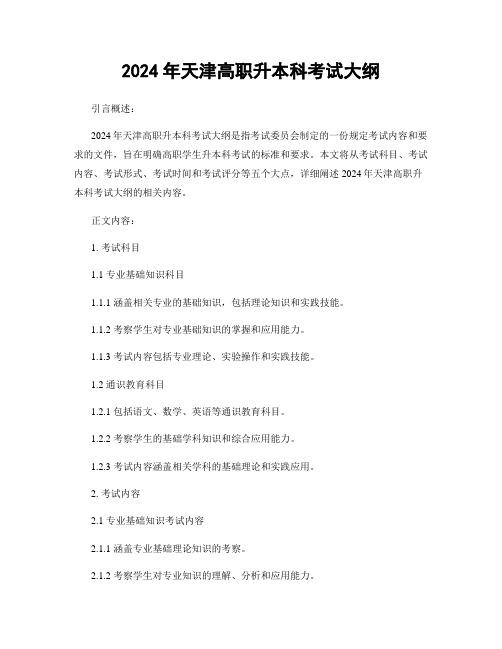
2024年天津高职升本科考试大纲引言概述:2024年天津高职升本科考试大纲是指考试委员会制定的一份规定考试内容和要求的文件,旨在明确高职学生升本科考试的标准和要求。
本文将从考试科目、考试内容、考试形式、考试时间和考试评分等五个大点,详细阐述2024年天津高职升本科考试大纲的相关内容。
正文内容:1. 考试科目1.1 专业基础知识科目1.1.1 涵盖相关专业的基础知识,包括理论知识和实践技能。
1.1.2 考察学生对专业基础知识的掌握和应用能力。
1.1.3 考试内容包括专业理论、实验操作和实践技能。
1.2 通识教育科目1.2.1 包括语文、数学、英语等通识教育科目。
1.2.2 考察学生的基础学科知识和综合应用能力。
1.2.3 考试内容涵盖相关学科的基础理论和实践应用。
2. 考试内容2.1 专业基础知识考试内容2.1.1 涵盖专业基础理论知识的考察。
2.1.2 考察学生对专业知识的理解、分析和应用能力。
2.1.3 考试形式包括选择题、填空题和简答题等。
2.2 实践技能考试内容2.2.1 考察学生的实践操作能力。
2.2.2 考试内容包括实验操作、工程设计和实践技能等。
2.2.3 考试形式包括实际操作、实验报告和技能演示等。
2.3 通识教育考试内容2.3.1 考察学生的语文、数学、英语等基础学科知识。
2.3.2 考试内容包括基础理论、应用题和阅读理解等。
2.3.3 考试形式包括选择题、填空题和作文等。
3. 考试形式3.1 专业基础知识考试形式3.1.1 选择题:考察学生对专业知识的基本掌握程度。
3.1.2 填空题:考察学生对专业知识的具体应用能力。
3.1.3 简答题:考察学生对专业知识的深入理解和分析能力。
3.2 实践技能考试形式3.2.1 实际操作:考察学生的实践操作能力。
3.2.2 实验报告:考察学生对实验数据分析和结果总结能力。
3.2.3 技能演示:考察学生的实际操作和技能应用能力。
3.3 通识教育考试形式3.3.1 选择题:考察学生对基础学科知识的掌握程度。
2023天津 专升本 考试大纲
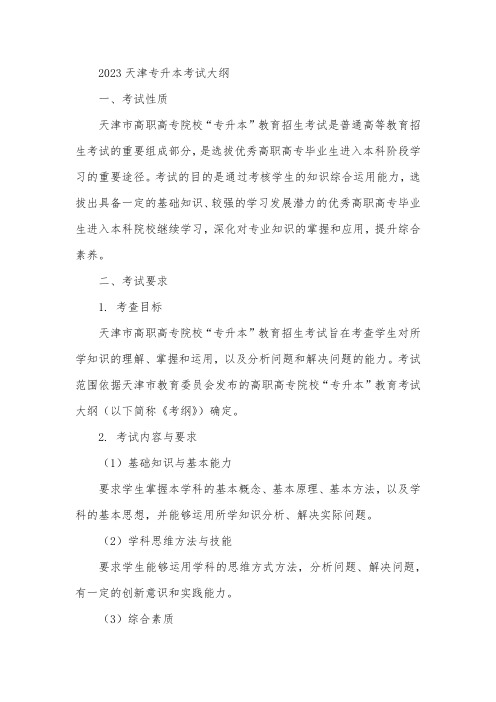
2023天津专升本考试大纲一、考试性质天津市高职高专院校“专升本”教育招生考试是普通高等教育招生考试的重要组成部分,是选拔优秀高职高专毕业生进入本科阶段学习的重要途径。
考试的目的是通过考核学生的知识综合运用能力,选拔出具备一定的基础知识、较强的学习发展潜力的优秀高职高专毕业生进入本科院校继续学习,深化对专业知识的掌握和应用,提升综合素养。
二、考试要求1. 考查目标天津市高职高专院校“专升本”教育招生考试旨在考查学生对所学知识的理解、掌握和运用,以及分析问题和解决问题的能力。
考试范围依据天津市教育委员会发布的高职高专院校“专升本”教育考试大纲(以下简称《考纲》)确定。
2. 考试内容与要求(1)基础知识与基本能力要求学生掌握本学科的基本概念、基本原理、基本方法,以及学科的基本思想,并能够运用所学知识分析、解决实际问题。
(2)学科思维方法与技能要求学生能够运用学科的思维方式方法,分析问题、解决问题,有一定的创新意识和实践能力。
(3)综合素质要求学生具备良好的思想道德素质、科学文化素质、身体心理素质等,具备较强的实践能力和创新精神。
三、考试形式与试卷结构1. 考试形式考试采用闭卷、笔试形式。
试卷满分值为150分,考试时长为120分钟。
2. 试卷结构(1)试卷内容结构根据不同学科的特点,试卷内容由不同的题型组成,包括选择题、填空题、简答题、论述题、应用题等。
其中,选择题和填空题主要考查学生对基础知识的掌握情况;简答题和论述题主要考查学生对知识的理解、分析和运用能力;应用题主要考查学生解决实际问题的能力。
各部分所占分值比例根据学科特点而定。
(2)试卷难度结构试卷难度结构依据《考纲》的要求确定。
试题难度分为容易、较容易、中等难度、较难和难五个等级,其中容易和较容易试题占40%,中等难度和较难试题占40%,难试题占20%。
职院公共课大学英语第三册考试大纲
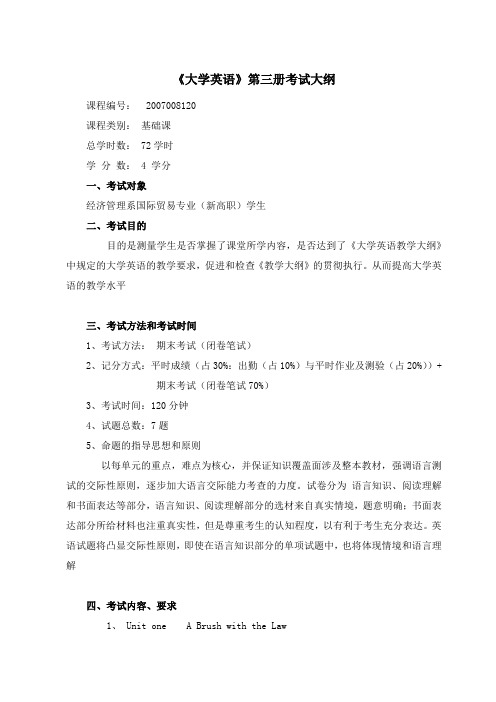
《大学英语》第三册考试大纲课程编号: 2007008120课程类别:基础课总学时数: 72学时学分数: 4 学分一、考试对象经济管理系国际贸易专业(新高职)学生二、考试目的目的是测量学生是否掌握了课堂所学内容,是否达到了《大学英语教学大纲》中规定的大学英语的教学要求,促进和检查《教学大纲》的贯彻执行。
从而提高大学英语的教学水平三、考试方法和考试时间1、考试方法:期末考试(闭卷笔试)2、记分方式:平时成绩(占30%:出勤(占10%)与平时作业及测验(占20%))+期末考试(闭卷笔试70%)3、考试时间:120分钟4、试题总数:7题5、命题的指导思想和原则以每单元的重点,难点为核心,并保证知识覆盖面涉及整本教材,强调语言测试的交际性原则,逐步加大语言交际能力考查的力度。
试卷分为语言知识、阅读理解和书面表达等部分,语言知识、阅读理解部分的选材来自真实情境,题意明确;书面表达部分所给材料也注重真实性,但是尊重考生的认知程度,以有利于考生充分表达。
英语试题将凸显交际性原则,即使在语言知识部分的单项试题中,也将体现情境和语言理解四、考试内容、要求1、 Unit one A Brush with the Law2、 Unit two The Woman Who Would Not Tell3、 Unit three Why I Teach4、 Unit four Lady Hermits Who Are Down But Not Out5、Unit five The Day Mother Cried6、Unit six A Day’s Wait7、Unit seven The Shelter8、Unit eight Daydream a Little9、Unit nine The Death of Hitler10、Unit ten The Fantastic Spurt in Technology要求:(1)掌握每单元核心词汇,核心短语,核心句型(2)了解文章背景及作品风格五、试题结构(内容、题型、分数分配)六、考试要求一、语言知识要求考生能够适当运用基本的语言及语法知识,掌握1000左右的词汇及相关词缀二、阅读要求考生读懂一般难度的文字材料,考生应能:(1)理解主旨要义;(2)理解文中具体信息(3)根据上下文推断生词的词义(4)作出简单判断和推理;(5)理解文章的基本结构;(6)理解作者的意图和态度。
天津14年专升本英语大纲(新)
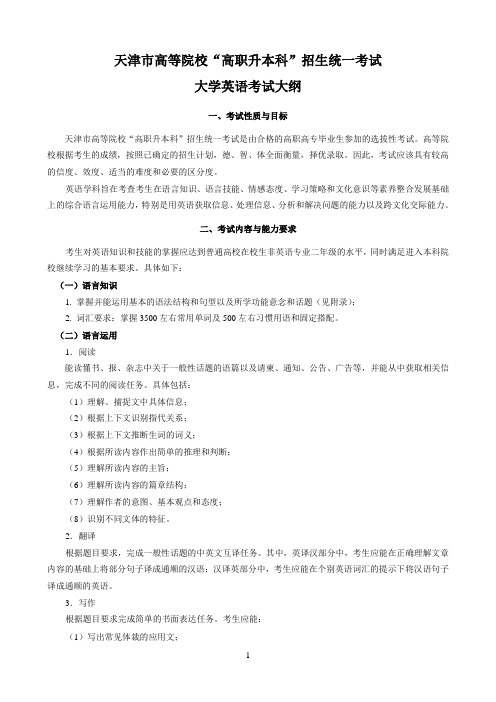
天津市高等院校“高职升本科”招生统一考试大学英语考试大纲一、考试性质与目标天津市高等院校“高职升本科”招生统一考试是由合格的高职高专毕业生参加的选拔性考试。
高等院校根据考生的成绩,按照已确定的招生计划,德、智、体全面衡量,择优录取。
因此,考试应该具有较高的信度、效度、适当的难度和必要的区分度。
英语学科旨在考查考生在语言知识、语言技能、情感态度、学习策略和文化意识等素养整合发展基础上的综合语言运用能力,特别是用英语获取信息、处理信息、分析和解决问题的能力以及跨文化交际能力。
二、考试内容与能力要求考生对英语知识和技能的掌握应达到普通高校在校生非英语专业二年级的水平,同时满足进入本科院校继续学习的基本要求。
具体如下:(一)语言知识1. 掌握并能运用基本的语法结构和句型以及所学功能意念和话题(见附录);2. 词汇要求:掌握3500左右常用单词及500左右习惯用语和固定搭配。
(二)语言运用1.阅读能读懂书、报、杂志中关于一般性话题的语篇以及请柬、通知、公告、广告等,并能从中获取相关信息,完成不同的阅读任务。
具体包括:(1)理解、捕捉文中具体信息;(2)根据上下文识别指代关系;(3)根据上下文推断生词的词义;(4)根据所读内容作出简单的推理和判断;(5)理解所读内容的主旨;(6)理解所读内容的篇章结构;(7)理解作者的意图、基本观点和态度;(8)识别不同文体的特征。
2.翻译根据题目要求,完成一般性话题的中英文互译任务。
其中,英译汉部分中,考生应能在正确理解文章内容的基础上将部分句子译成通顺的汉语;汉译英部分中,考生应能在个别英语词汇的提示下将汉语句子译成通顺的英语。
3.写作根据题目要求完成简单的书面表达任务。
考生应能:(1)写出常见体裁的应用文;(2)描述人物或事件,并进行评论;(3)根据文字提纲或图表提供的信息写短文或报告;(4)正确有效地运用所学语言知识,清楚、连贯地传递信息,表达思想,做到语句通顺,结构完整,文体规范。
2024年天津专升本考试大纲

2024年天津专升本考试大纲2024年天津专升本考试大纲涵盖了多个学科的知识,下面将按照各学科进行相关参考内容的介绍。
1. 政治学科:2024年天津专升本政治学科大纲主要包含了马克思主义基本原理、毛泽东思想与中国特色社会主义理论体系等方面的内容。
考生需要掌握马克思主义哲学基本原理,如唯物论、辩证法;深入了解社会主义核心价值观以及中国共产党的基本理论和基本路线等内容。
2. 英语学科:2024年天津专升本英语学科大纲主要包含了词汇与语法、听力与口语、阅读与理解、写作与翻译等方面的内容。
考生需要掌握扎实的英语语法基础知识,具备听力理解和口语表达的能力,能够熟练阅读英语文章并理解其中的主要信息,同时有一定的英语写作和翻译能力。
3. 数学学科:2024年天津专升本数学学科大纲主要包含了数与式、函数与方程、数学基本概念与方法、数列、几何与变换等方面的内容。
考生需要掌握数学中的基础概念、性质和计算方法,能够熟练运用代数、函数、解析几何等基本工具解题,并具备一定的定理证明能力。
4. 专业综合素质考核学科:2024年天津专升本专业综合素质考核学科大纲主要包含了综合素质测试、专业知识测试、外语口语面试等方面的内容。
考生需要全面了解相关专业知识,具备一定的跨学科综合能力,能够灵活运用所学知识解决实际问题,并具备一定的外语口语表达能力。
5. 专业课学科:2024年天津专升本专业课学科大纲根据不同的专业进行具体安排,例如,- 机械制造与自动化专业课:包括机械设计与制造、自动控制原理、微机原理与接口技术、材料力学等方面的内容。
- 电气工程及其自动化专业课:包括电路分析、信号与系统、电磁场与电磁波、电力系统分析等方面的内容。
- 经济学专业课:包括宏观经济学、微观经济学、经济数学、经济法等方面的内容。
以上仅为部分学科内容的介绍,考生在备考过程中应根据自己的专业要求,结合大纲的具体要求进行有针对性的复习。
同时,还应注重练习题目和真题,加强对知识的运用和理解,提高解题能力。
专升本英语考试大纲

专升本英语考试大纲一、考试性质专升本英语考试是为选拔优秀专科毕业生进入本科阶段学习而设置的选拔性考试。
二、考试目标1、语言知识11 掌握英语词汇和语法知识。
111 词汇量达到具体词汇量左右。
112 熟练掌握常见的语法结构和句型。
2、语言技能21 阅读理解能力211 能读懂一般性题材的英文文章。
212 理解主旨要义、具体信息。
213 能根据上下文推测生词词义。
22 写作能力221 能根据给定题目或提示写出一篇具体字数左右的短文。
222 内容完整,条理清晰,语言通顺。
23 翻译能力231 能将一般性题材的中文句子或段落翻译成英文。
232 能将一般性题材的英文句子或段落翻译成中文。
24 听力理解能力241 能听懂日常对话和一般性题材的短文。
242 理解主要内容和关键信息。
三、考试内容与要求1、词汇11 熟练掌握具体教材中规定的词汇。
12 了解常见的词汇搭配和习惯用法。
2、语法21 名词、代词、数词、冠词211 掌握名词的分类、数和格。
212 掌握代词的种类、用法。
213 掌握数词的基本用法。
214 掌握冠词的基本用法。
22 形容词、副词221 掌握形容词和副词的比较级和最高级。
222 掌握形容词和副词的用法。
23 动词231 掌握动词的时态、语态。
232 掌握非谓语动词的用法。
233 掌握情态动词的用法。
24 句子241 掌握各类从句的用法,如宾语从句、定语从句、状语从句等。
242 掌握句子的种类,如陈述句、疑问句、祈使句、感叹句。
243 掌握句子的成分,如主语、谓语、宾语、定语、状语、补语。
3、阅读理解31 理解文中的具体信息。
32 理解主旨大意。
33 进行推理判断。
34 理解作者的意图、观点和态度。
4、写作41 命题作文411 能根据所给题目和要求进行写作。
412 内容切题,条理清楚,语言通顺。
42 书信、通知等应用文写作421 能根据给定的情境和要求写出相应的应用文。
422 格式正确,语言得体。
2024年专升本英语大纲

2024年专升本英语大纲2024年专升本英语考试大纲包括以下内容:一、考试内容概述本考试共有六个部分:语音、词汇和语法结构、完形填空、阅读理解、翻译和写作。
二、考试形式考试采用闭卷、笔答的考试方式。
满分:150分(单科成绩)。
考试时间:120分钟。
三、考试目标语音:考生应能掌握英语语音基础知识,包括音素、音位、音节、重音、语调等,并能运用这些知识进行单词和句子的朗读和听写。
词汇和语法结构:考生应能掌握约3500个英语单词和500个左右常用短语,并能运用这些词汇进行阅读和写作。
此外,考生还应能掌握基本的英语语法规则,包括词法、句法、时态、语态、语气等,并能运用这些规则进行语言的理解和表达。
完形填空:考生应能通过阅读一篇约200词的短文,理解其主旨大意和细节信息,并能根据上下文填写所缺单词或短语,使短文恢复完整。
阅读理解:考生应能阅读三篇约300词的短文,理解其主旨大意、细节信息、作者观点和态度等,并能根据所读内容回答问题或完成相关任务。
翻译:考生应能将一篇约150词的英文短文翻译成中文,或将一篇约150字的中文短文翻译成英文,要求译文准确、通顺。
写作:考生应能根据所给题目或提示,用英语写一篇约120词的短文,要求内容切题、表达清晰、语法正确、语言流畅。
四、考试要求考生应达到相当于全国高等学校英语专业教学大纲规定的四级要求。
考试中各部分试题的设计应充分考虑考生的实际语言水平和认知能力,确保试题的科学性、客观性和可行性。
考试内容应注重考查考生的语言综合运用能力,包括听力、阅读、写作和翻译等方面的技能。
考试形式应为闭卷、笔答方式,考试时间为120分钟,试卷满分为150分。
考试大纲和样题应在考前向社会公布,以便考生了解考试内容和要求,做好备考工作。
以上是2024年专升本英语考试大纲的相关信息,希望能对您有所帮助。
除了了解考试大纲和做历年真题外,考生在备考专升本英语考试时还可以采取以下措施:制定学习计划:根据考试大纲和自己的英语水平,制定一个详细的学习计划,包括每天的学习时间和学习内容。
“专升本”招生考试《大学英语》课程考试大纲
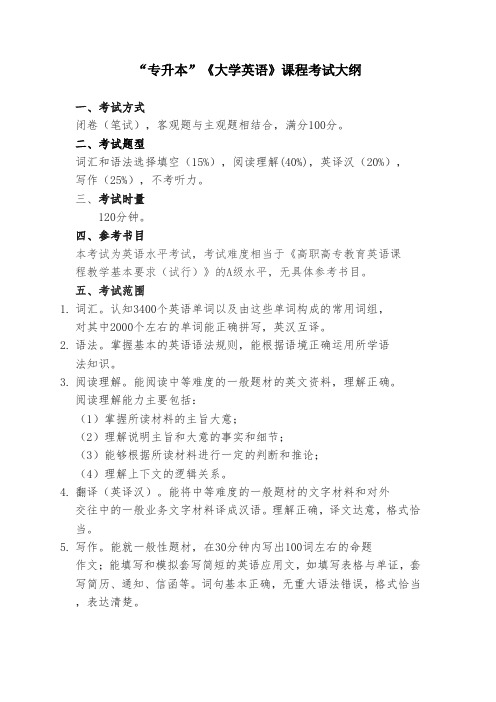
“专升本”《大学英语》课程考试大纲
一、考试方式
闭卷(笔试),客观题与主观题相结合,满分100分。
二、考试题型
词汇和语法选择填空(15%),阅读理解(40%),英译汉(20%),写作(25%),不考听力。
三、考试时量
120分钟。
四、参考书目
本考试为英语水平考试,考试难度相当于《高职高专教育英语课程教学基本要求(试行)》的A级水平,无具体参考书目。
五、考试范围
1.词汇。
认知3400个英语单词以及由这些单词构成的常用词组,
对其中2000个左右的单词能正确拼写,英汉互译。
2.语法。
掌握基本的英语语法规则,能根据语境正确运用所学语
法知识。
3.阅读理解。
能阅读中等难度的一般题材的英文资料,理解正确。
阅读理解能力主要包括:
(1)掌握所读材料的主旨大意;
(2)理解说明主旨和大意的事实和细节;
(3)能够根据所读材料进行一定的判断和推论;
(4)理解上下文的逻辑关系。
4.翻译(英译汉)。
能将中等难度的一般题材的文字材料和对外
交往中的一般业务文字材料译成汉语。
理解正确,译文达意,格式恰当。
5.写作。
能就一般性题材,在30分钟内写出100词左右的命题
作文;能填写和模拟套写简短的英语应用文,如填写表格与单证,套写简历、通知、信函等。
词句基本正确,无重大语法错误,格式恰当,表达清楚。
天津专升本考试科目及考试大纲
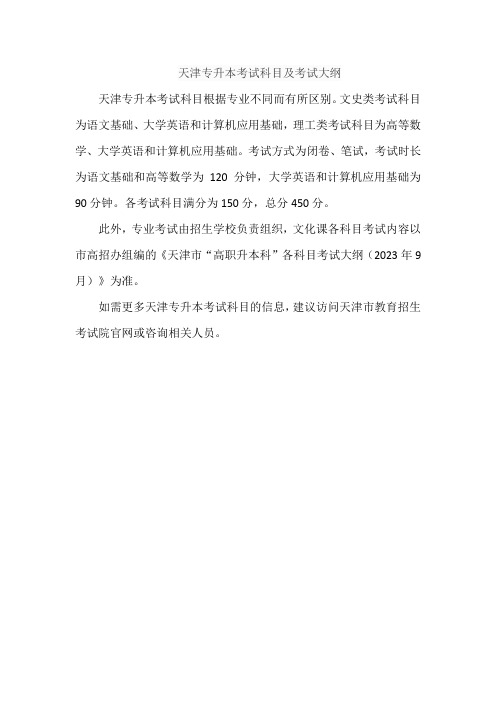
天津专升本考试科目及考试大纲
天津专升本考试科目根据专业不同而有所区别。
文史类考试科目为语文基础、大学英语和计算机应用基础,理工类考试科目为高等数学、大学英语和计算机应用基础。
考试方式为闭卷、笔试,考试时长为语文基础和高等数学为120分钟,大学英语和计算机应用基础为90分钟。
各考试科目满分为150分,总分450分。
此外,专业考试由招生学校负责组织,文化课各科目考试内容以市高招办组编的《天津市“高职升本科”各科目考试大纲(2023年9月)》为准。
如需更多天津专升本考试科目的信息,建议访问天津市教育招生考试院官网或咨询相关人员。
23年天津专升本英语考试大纲
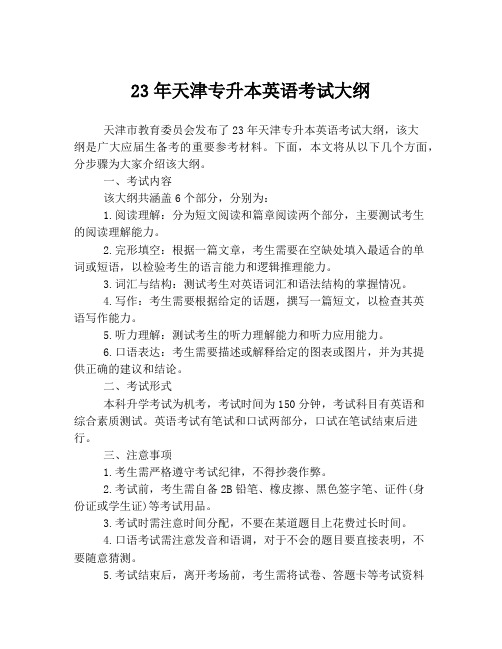
23年天津专升本英语考试大纲天津市教育委员会发布了23年天津专升本英语考试大纲,该大纲是广大应届生备考的重要参考材料。
下面,本文将从以下几个方面,分步骤为大家介绍该大纲。
一、考试内容该大纲共涵盖6个部分,分别为:1.阅读理解:分为短文阅读和篇章阅读两个部分,主要测试考生的阅读理解能力。
2.完形填空:根据一篇文章,考生需要在空缺处填入最适合的单词或短语,以检验考生的语言能力和逻辑推理能力。
3.词汇与结构:测试考生对英语词汇和语法结构的掌握情况。
4.写作:考生需要根据给定的话题,撰写一篇短文,以检查其英语写作能力。
5.听力理解:测试考生的听力理解能力和听力应用能力。
6.口语表达:考生需要描述或解释给定的图表或图片,并为其提供正确的建议和结论。
二、考试形式本科升学考试为机考,考试时间为150分钟,考试科目有英语和综合素质测试。
英语考试有笔试和口试两部分,口试在笔试结束后进行。
三、注意事项1.考生需严格遵守考试纪律,不得抄袭作弊。
2.考试前,考生需自备2B铅笔、橡皮擦、黑色签字笔、证件(身份证或学生证)等考试用品。
3.考试时需注意时间分配,不要在某道题目上花费过长时间。
4.口语考试需注意发音和语调,对于不会的题目要直接表明,不要随意猜测。
5.考试结束后,离开考场前,考生需将试卷、答题卡等考试资料放在指定位置,并配合考场工作人员检查。
四、备考建议1.在阅读理解及完形填空方面,重点训练阅读速度和练习推理判断。
2.在词汇与结构方面,需加强对英文语法规则的掌握,多练习选填题或翻译。
3.在写作方面,需多练习各类英文写作题目,并注重语法、词汇的运用和段落的转换。
4.在听力理解方面,需多听英语广播或英语听力材料,并在做题时注意听清关键词语。
5.在口语表达方面,需加强发音练习、语调训练和词汇积累,多与同学或老师进行口语训练。
总之,23年天津专升本英语考试大纲是指导广大考生备考的重要材料,考生需要充分了解考试内容和形式,逐步加强各方面英语能力的练习,提高自己的应试水平,做好充分准备才能取得好成绩。
天津三二分段中职接高职《英语考试大纲》
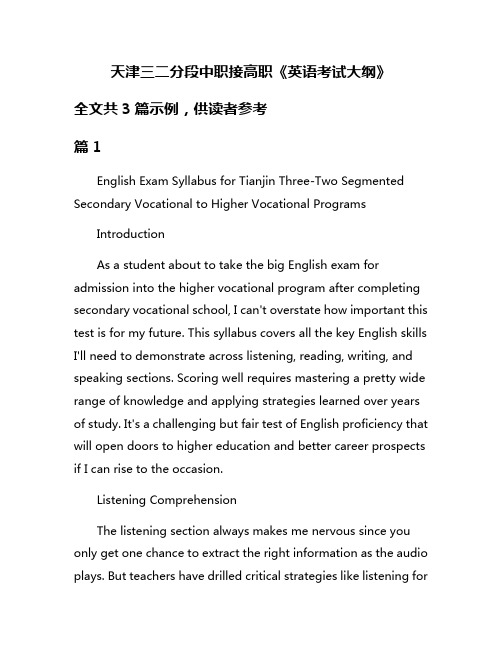
天津三二分段中职接高职《英语考试大纲》全文共3篇示例,供读者参考篇1English Exam Syllabus for Tianjin Three-Two Segmented Secondary Vocational to Higher Vocational ProgramsIntroductionAs a student about to take the big English exam for admission into the higher vocational program after completing secondary vocational school, I can't overstate how important this test is for my future. This syllabus covers all the key English skills I'll need to demonstrate across listening, reading, writing, and speaking sections. Scoring well requires mastering a pretty wide range of knowledge and applying strategies learned over years of study. It's a challenging but fair test of English proficiency that will open doors to higher education and better career prospects if I can rise to the occasion.Listening ComprehensionThe listening section always makes me nervous since you only get one chance to extract the right information as the audio plays. But teachers have drilled critical strategies like listening forkey words, taking focused notes, and picking out context clues. There are typically 3-4 longer conversations or talks covering everyday topics as well as the sort of academic subjects we may encounter in higher vocational programs. Questions ask about main ideas, specific details, inferences, and speaker purpose or attitude. Conversations between students and professors are usually the most difficult due to the formal academic language used.Reading ComprehensionThank goodness we get ample time and can refer back to the passages as much as needed for this section! The reading covers practical text types like manuals, schedules, forms, and signage mixed with more academic passages on history, science, culture, and economics. Questions run the gamut from analyzing the author's perspective to defining tricky vocabulary terms in context. Some of the thorniest readings come from classic novels or scholarly journal extracts filled with deeper metaphorical meaning and complex grammatical structures to untangle. Skimming, scanning, and structuring predictions about passage content are vital reading skills to apply effectively.WritingThe writing tasks really separate those who have absorbed and can properly apply the principles of effective composition from those still struggling. We need to write two passages for this exam: one shorter personal response to a given prompt or scenario, and one longer persuasive or expository essay. The shorter response allows us to show skills like using appropriate transitional phrases, vocabulary precision, and clear organization. But the longer essay tests higher-order skills like formulating and supporting a thesis, employing evidence and examples, and maintaining a consistent tone and focus. Proper grammar, spelling, and mechanics are key for both writing tasks.SpeakingThis part feels like such a wild card since we essentially have to improvise orally on unseen prompts after a minute of prep time. The speaking section tests overall oral fluency, pronunciation, grammar, and vocabulary usage in responding to questions and scenarios. There's a read-aloud task where we must properly convey the meaning of a short passage. Then there are open-ended prompts where we have to construct and deliver a logically sound spoken argument or narrative incorporating designated vocabulary words. Articulation, pacing,and formulating sharp transitions between thoughts on the fly are crucial abilities to demonstrate.Test PreparationsWith the importance of qualifying for higher vocational studies riding on this comprehensive English exam, I've been intensely preparing through a strategic combination of practice tests, error analysis, vocabulary drills, and active classroom participation. My teachers keep stressing the value of getting plenty of interactive English listening and speaking practice outside of class, so I try to watch English movies, news, and videos as much as possible too. At the end of the day, this all boils down to years of steadily accumulated skills finally getting showcased under serious testing pressure. If I've genuinely internalized and can practically apply what I've learned across all aspects of English, this could be the opportunity that changes my educational trajectory for the better.篇2Tianjin Secondary Vocational to Higher Vocational 《English Exam Syllabus》As a student transitioning from secondary vocational school to higher vocational education, the English exam is a majorhurdle we all have to clear. The official syllabus outlines what we're expected to know and the skills we should have mastered by test day. Here's a rundown of the key points:Listening ComprehensionThis section evaluates our ability to understand spoken English across different contexts. We'll hear recordings of conversations, lectures, news broadcasts and more. The tasks involve answering multiple choice and fill-in-the-blank questions about the main ideas, details, speakers' attitudes and implied meanings.To do well, we need strategies for catching key information despite accents, background noise and unfamiliar vocabulary. Getting the gist is often enough - we don't need to understand every single word. Taking neat notes as we listen can also help jog our memory later.Language KnowledgeHere they really drill down into our foundations - pronunciation, grammar, vocabulary and discourse structure. We might need to read passages and identify errors, explain shades of meaning, or rewrite sentences correctly.There's just no way around needing a solid grasp of English fundamentals like verb tenses, parts of speech, idioms and common phrases. Reviewing the basics regularly instead of cramming last-minute is crucial. But rote memorization alone won't cut it - we have to learn how to actually apply the rules in context.Reading ComprehensionThis part covers our skills in understanding written English across a range of genres - articles, fiction, advertisements, manuals and more. We'll answer multiple choice and short answer questions that test our ability to identify main ideas, analyze stylistic elements, make inferences and summarize key points.The passages can get really long and dense, with tons of idioms and cultural references to untangle. Building reading stamina through regular practice is a must. Learning strategies to identify transitional phrases, skim for gist, and recognize rhetorical devices is also super helpful.WritingThis is where we show our abilities to write clear,well-structured and detailed English compositions for differentpurposes like narrating experiences, explaining viewpoints, or describing objects/processes.We'll likely have to write two essays - one shorter one guided by prompts, and one longer more open-ended piece. Having a system for quickly outlining and organizing ideas is key when time is limited. We also need a decent vocabulary pool to draw varied and precise wording from.Overall, preparing for this English exam requires a balanced approach of building knowledge and honing skills across all domains. It's a tough challenge, but putting in steady effort over time should put us in a solid position to demonstrate our English abilities successfully on test day. The syllabus acts as a roadmap to focus our studies in the right areas.篇3English Exam Syllabus for Tianjin Secondary Vocational to Higher Vocational ProgramsHey everyone, it's your friendly student insider here to give you all the details on the English exam we'll be taking to bridge from secondary vocational school to the higher vocational programs. I know, I know - another exam to study for? But lookon the bright side - this is our ticket to leveling up our education and getting some seriously employable skills.First off, let's talk about the structure of this exam. It's got four main sections that will test our English skills from pretty much every angle:Reading ComprehensionYou know the drill - we'll read some passages and then have to answer comprehension questions showing we understood the main ideas, details, and vocabulary. My advice? Read, read, read leading up to the exam to build those comprehension muscles.WritingWe've got to prove we can write a cohesive, logical piece with a clear main idea and supporting details. Could be an essay, report, letter, you name it. Practice makes perfect here - write as much as you can beforehand.ListeningListening comprehension is key for communicating in the real world. We'll hear conversations and monologues, then have to answer questions testing if we caught the key points. My tip? Watch movies and listen to podcasts in English - get those ears used to understanding natural speech.SpeakingYep, it's time to exercise those speaking skills too! We'll be asked to speak on a given topic for 1-2 minutes to demonstrate our oral English abilities. Practicing speaking out loud, maybe even recording yourself, could really help calm those nerves.Now for the content areas we need to prepare for within those four sections. This exam will cover:Everyday TopicsFamily, hobbies, daily routines, food, shopping, etc. The familiar stuff we've been learning for years - keep that vocab fresh.School and WorkDescribing school life, future job goals, workplaces, career skills. This is an exam for vocational students after all - gotta show we can talk the talk for our future professions.Social IssuesCurrent events, social trends, hot topics like the environment. The exam wants to see we have a grasp on real-world issues too.Literature and CultureUnderstanding excerpts from novels, poems, plays, as well as key cultural elements like traditions and arts. Don't forget to brush up on your literary analysis abilities.You're probably wondering - what level of English do I really need here? Well, the target is something like an intermediate to intermediate-high level. We need to be able to:Understand main ideas and most details in somewhat complex listening and reading materialsWrite organized, cohesive pieces with proper grammar, vocabulary, and styleUse a range of vocabulary and structures to communicate clearlyShow awareness of cultural。
天津高职升本大学英语考试大纲

天津市高等院校“高职升本科”招生统一考试大学英语考试大纲一、考试性质与目标天津市高等院校“高职升本科”招生统一考试是由合格的高职高专毕业生参加的选拔性考试。
高等院校根据考生的成绩,按照已确定的招生计划,德、智、体全面衡量,择优录取。
因此,考试应该具有较高的信度、效度、适当的难度和必要的区分度。
英语学科旨在考查考生在语言知识、语言技能、情感态度、学习策略和文化意识等素养整合发展基础上的综合语言运用能力,特别是用英语获取信息、处理信息、分析和解决问题的能力以及跨文化交际能力。
二、考试内容与能力要求考生对英语知识和技能的掌握应达到普通高校在校生非英语专业二年级的水平,同时满足进入本科院校继续学习的基本要求。
具体如下:(一)语言知识1. 掌握并能运用基本的语法结构和句型以及所学功能意念和话题(见附录);2. 词汇要求:掌握3500左右常用单词及500左右习惯用语和固定搭配。
(二)语言运用1.阅读能读懂书、报、杂志中关于一般性话题的语篇以及请柬、通知、公告、广告等,并能从中获取相关信息,完成不同的阅读任务。
具体包括:(1)理解、捕捉文中具体信息;(2)根据上下文识别指代关系;(3)根据上下文推断生词的词义;(4)根据所读内容作出简单的推理和判断;(5)理解所读内容的主旨;(6)理解所读内容的篇章结构;(7)理解整理的意图、基本观点和态度;(8)识别不同文体的特征。
2.翻译根据题目要求,完成一般性话题的中英文互译任务。
其中,英译汉部分中,考生应能在正确理解文章内容的基础上将部分句子译成通顺的汉语;汉译英部分中,考生应能在个别英语词汇的提示下将汉语句子译成通顺的英语。
3.写作根据题目要求完成简单的书面表达任务。
考生应能:(1)写出常见体裁的应用文;(2)描述人物或事件,并进行评论;(3)根据文字提纲或图表提供的信息写短文或报告;(4)正确有效地运用所学语言知识,清楚、连贯地传递信息,表达思想,做到语句通顺,结构完整,文体规范。
升本英语复习考试大纲
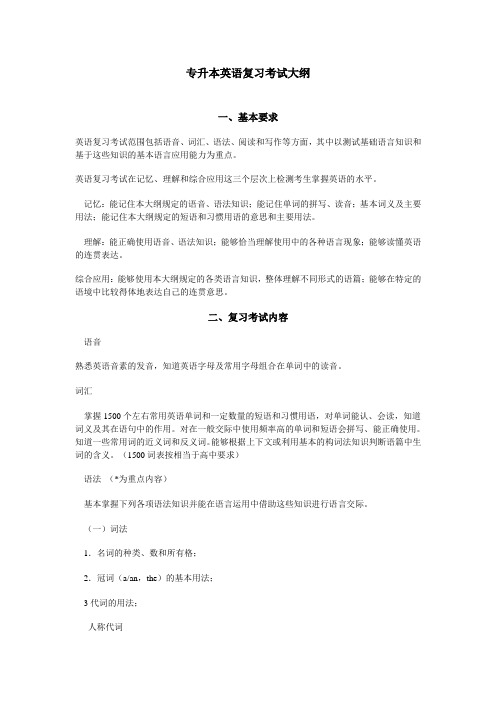
专升本英语复习考试大纲一、基本要求英语复习考试范围包括语音、词汇、语法、阅读和写作等方面,其中以测试基础语言知识和基于这些知识的基本语言应用能力为重点。
英语复习考试在记忆、理解和综合应用这三个层次上检测考生掌握英语的水平。
记忆:能记住本大纲规定的语音、语法知识;能记住单词的拼写、读音;基本词义及主要用法;能记住本大纲规定的短语和习惯用语的意思和主要用法。
理解:能正确使用语音、语法知识;能够恰当理解使用中的各种语言现象;能够读懂英语的连贯表达。
综合应用:能够使用本大纲规定的各类语言知识,整体理解不同形式的语篇;能够在特定的语境中比较得体地表达自己的连贯意思。
二、复习考试内容语音熟悉英语音素的发音,知道英语字母及常用字母组合在单词中的读音。
词汇掌握1500个左右常用英语单词和一定数量的短语和习惯用语,对单词能认、会读,知道词义及其在语句中的作用。
对在一般交际中使用频率高的单词和短语会拼写、能正确使用。
知道一些常用词的近义词和反义词。
能够根据上下文或利用基本的构词法知识判断语篇中生词的含义。
(1500词表按相当于高中要求)语法(*为重点内容)基本掌握下列各项语法知识并能在语言运用中借助这些知识进行语言交际。
(一)词法1.名词的种类、数和所有格;2.冠词(a/an,the)的基本用法;3代词的用法;人称代词物主代词指示代词不定代词疑问代词关系代词*4.“i t”作引导词、非人称代词和在强调句型中的用法; 5.数词的基本用法;6.形容词和副词的基本用法;*7.动词的用法;1)动词的种类2)时态(1)一般现在时(2)一般过去时(3)一般将来时(4)现在进行时(5)过去进行时(6)将来进行时(7)现在完成时(8)过去完成时(9)将来完成时(10)过去将来时(11)现在完成进行时3)被动语态4)非谓语动词的基本用法(l)动词不定式(2)动名词(3)分词:现在分词和过去分词8.常用介词和连词(二)句法1.句子种类l)陈述句(肯定式与否定式)2)疑问句(1)一般疑问句(2)特殊疑问句(3)反意疑问句(4)选择疑问句3)祈使句4)感叹句5)并列句6)复合句*(l)名词性从句主语从句宾语从句表语从句同位语从句*(2)定语从句*(3)状语从句时间状语从句地点状语从句方式状语从句目的状语从句结果状语从句原因状语从句让步状语从句2.句子成分:主语、谓语、表语、宾语、定语、状语、补足语*3.倒装结构4.主谓一致三、考试形式及试卷结构考试方法和时间闭卷。
2024年专升本英语考试大纲
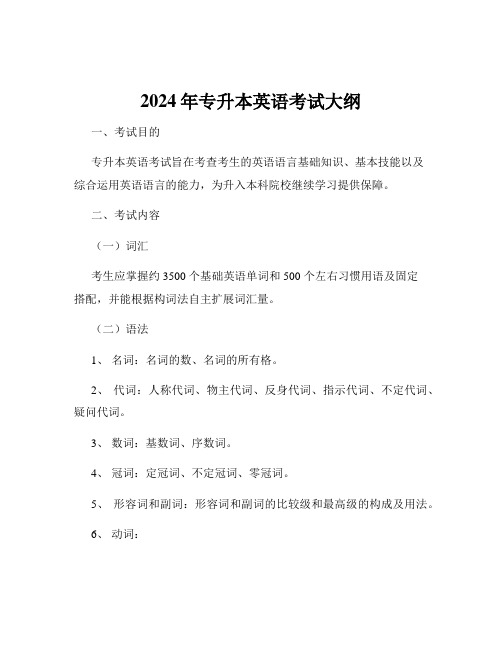
2024年专升本英语考试大纲一、考试目的专升本英语考试旨在考查考生的英语语言基础知识、基本技能以及综合运用英语语言的能力,为升入本科院校继续学习提供保障。
二、考试内容(一)词汇考生应掌握约 3500 个基础英语单词和 500 个左右习惯用语及固定搭配,并能根据构词法自主扩展词汇量。
(二)语法1、名词:名词的数、名词的所有格。
2、代词:人称代词、物主代词、反身代词、指示代词、不定代词、疑问代词。
3、数词:基数词、序数词。
4、冠词:定冠词、不定冠词、零冠词。
5、形容词和副词:形容词和副词的比较级和最高级的构成及用法。
6、动词:动词的时态:一般现在时、一般过去时、一般将来时、现在进行时、过去进行时、现在完成时、过去完成时、过去将来时。
动词的语态:主动语态和被动语态。
非谓语动词:动词不定式、动名词、分词(现在分词和过去分词)。
7、情态动词:can, could, may, might, must, have to, ought to, shall, should, will, would 等的用法。
8、虚拟语气:if 条件句中的虚拟语气,wish 后的宾语从句中的虚拟语气等。
9、介词:常用介词的基本用法。
10、连词:并列连词和从属连词的用法。
11、句子:句子种类:陈述句、疑问句、祈使句、感叹句。
句子成分:主语、谓语、宾语、定语、状语、补语。
简单句、并列句和复合句:宾语从句、状语从句、定语从句、主语从句、表语从句、同位语从句。
(三)阅读理解1、能读懂题材熟悉、难度适中、体裁多样的英语短文。
2、理解文中主旨要义,理解文中具体信息,根据上下文推断单词和短语的含义,做出简单判断和推理,理解文章的基本结构,理解作者的意图、观点和态度。
(四)翻译1、能够将一般性题材的英语句子或段落翻译成汉语,译文基本准确,通顺。
2、能够将汉语句子或段落翻译成英语,译文基本符合英语语法和表达习惯。
(五)写作1、能根据所给题目和要求撰写一篇 120 词左右的英语短文。
2024年天津高职升本科考试大纲
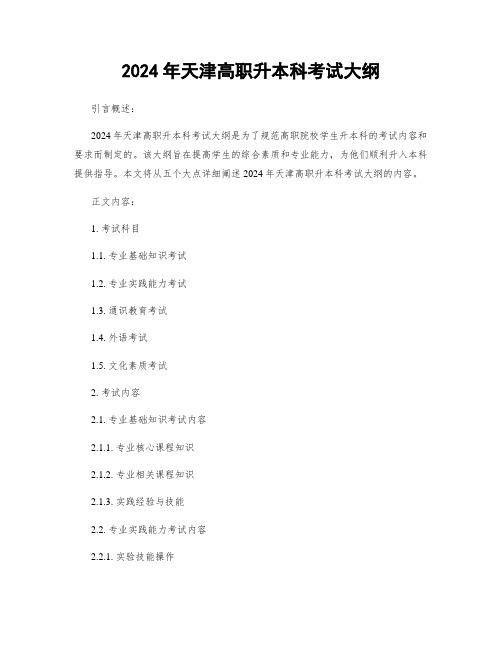
2024年天津高职升本科考试大纲引言概述:2024年天津高职升本科考试大纲是为了规范高职院校学生升本科的考试内容和要求而制定的。
该大纲旨在提高学生的综合素质和专业能力,为他们顺利升入本科提供指导。
本文将从五个大点详细阐述2024年天津高职升本科考试大纲的内容。
正文内容:1. 考试科目1.1. 专业基础知识考试1.2. 专业实践能力考试1.3. 通识教育考试1.4. 外语考试1.5. 文化素质考试2. 考试内容2.1. 专业基础知识考试内容2.1.1. 专业核心课程知识2.1.2. 专业相关课程知识2.1.3. 实践经验与技能2.2. 专业实践能力考试内容2.2.1. 实验技能操作2.2.2. 实际问题解决能力2.2.3. 创新能力和实践能力2.3. 通识教育考试内容2.3.1. 人文社科知识2.3.2. 自然科学知识2.3.3. 社会实践和创新能力2.4. 外语考试内容2.4.1. 听力理解2.4.2. 阅读理解2.4.3. 口语表达和写作能力2.5. 文化素质考试内容2.5.1. 中国传统文化知识2.5.2. 现代文化与艺术知识2.5.3. 社会伦理与法律知识3. 考试要求3.1. 专业基础知识考试要求3.1.1. 掌握专业核心课程知识3.1.2. 熟悉专业相关课程知识3.1.3. 具备实践经验与技能3.2. 专业实践能力考试要求3.2.1. 熟练掌握实验技能操作3.2.2. 具备实际问题解决能力3.2.3. 具备创新能力和实践能力3.3. 通识教育考试要求3.3.1. 熟悉人文社科知识3.3.2. 掌握自然科学知识3.3.3. 具备社会实践和创新能力3.4. 外语考试要求3.4.1. 良好的听力理解能力3.4.2. 准确的阅读理解能力3.4.3. 流利的口语表达和写作能力3.5. 文化素质考试要求3.5.1. 熟悉中国传统文化知识3.5.2. 了解现代文化与艺术知识3.5.3. 掌握社会伦理与法律知识总结:2024年天津高职升本科考试大纲的内容包括考试科目、考试内容和考试要求。
2021年普通专升本《大学英语》考试大纲

2021年普通专升本《大学英语》考试大纲本考试的目的是选拔部分高职高专毕业生升入普通本科高校继续进行相关专业本科阶段学习,考查考生是否具有运用各项基本英语技能的能力以及学生对语法结构和词语用法的掌握程度,既测试学生的综合能力,也测试学生的单项技能。
一、考试科目名称:《大学英语》二、考试方式:笔试、闭卷三、考试时间:120分钟四、试卷结构:总分100分1.英语应用(共25分)词汇和语法(其中词汇10小题,语法15小题;每小题1分)2.阅读理解(共45分)篇章1.[选择题,4选1]5小题(每小题2分,共10分)篇章2.[选择题,4选1]5小题(每小题2分,共10分)篇章3.[选择题,4选1]5小题(每小题2分,共10分)篇章4.[选择题,4选1]5小题(每小题2分,共10分)*篇章5.[填充题]5小题(每小题1分,共5分)3.英译汉(共20分)单句翻译:[选择题,3选1]5小题(每小题2分,共10分)段落翻译:1个段落(共10分)4.写作(共10分)应用文1篇 (10分)五、考试的基本要求以《高职高专教育英语课程教学基本要求(试行)》中的B级标准(听力部分除外)为基本要求,注重考查学生实际运用语言的能力。
六、考试范围1.词汇。
掌握2500个英语单词以及由这些词构成的常用词组,对其中1500个左右的单词能正确拼写,英汉互译。
2.语法。
掌握基本的英语语法规则,在听、说、读、写、译中能正确运用所学语法知识。
3.阅读。
能阅读中等难度的一般题材的简短英文资料,理解正确。
在阅读生词不超过总词数3%的英文资料时,阅读速度不低于每分钟50词。
能读懂通用的简短实用文字材料,如信函、产品说明等,理解基本正确。
4.翻译(英译汉)。
能将中等偏易难度的一般题材的文字材料和对外交往中的一般业务的英文材料译成汉语。
理解正确,译文达意,格式恰当。
5.写作。
能运用所学词汇和语法用英语写出简短的应用文,如书信、便函、简历、通知、海报等。
专升本《大学英语》考试大纲

2021年专升本【大学英语】考试大纲一、考试内容本考试包括六个局部:1〕写作;2〕快速阅读;3〕仔细阅读;4) 词汇与结构;5〕完型填空6〕翻译。
全部题目按顺序统一编号。
〔一〕写作〔Part I Writing 〕共1题,考试时间30分钟。
要求考生写出不少于120词的短文,试卷上可能给出题目,或规定场景,或看图作文,或写报告、评论、发言稿和日常应用文等,要求表达思想清楚,意义连贯,无重大语法错误。
短文写作局部的目的是测试学生运用英语书面表达思想的初步能力。
(二)快速阅读〔Part II:Reading Comprehension:Skimming and Scanning〕采用1-2篇较长篇幅的文章或多篇短文,总长度约为1000词,共10个小题。
考试时间15分钟。
要求考生运用略读和查读的技能从篇章中获取信息。
略读考核学生通过快速阅读获取文章主旨大意或中心思想的能力,阅读速度约每分钟100词。
查读考核学生利用各种提示,如数字、大写单词、段首或句首词等,快速查找特定信息的能力。
快速阅读理解局部采用的题型有单项选择、是非判断、句子填空、完成句子等测试学生通过阅读获取书面信息的能力。
〔三〕仔细阅读〔Part III: Reading Comprehension:Reading in Depth〕共四篇短文,20个小题,考试时间40分钟。
短文平均长度为300-350词。
本局部测试考生在不同层面上的阅读理解能力,包括理解主旨大意和重要细节、综合分析、推测判断以及根据上下文推测词义等。
短文后有假设干个问题,考生根据对文章的理解,从每题的四个选项中选择最正确答案。
〔四〕词汇与结构〔Part IV: Vocabulary and Structure〕共30小题,考试时间15分钟。
目的是测试学生运用词汇、短语及语法结构的能力。
词汇题是考查考生对词汇及词组的辩异能力以及在句中的具体运用;结构题是测试考生对标准英语书面语语法结构的掌握程度。
专升本大学英语考试大纲

专升本大学英语考试大纲全国教师教育网络联盟入学联考专科起点升本科英语考试大纲全国教师教育网络联盟入学联考专科起点升本科公共英语课程考试大纲总要求英语复习考试范围包括语法、词汇、阅读、完形填空和写作四个方面,其中以测试基础语言知识和基于这些知识的基本语言综合运用能力为重点。
具体要求考生掌握英语的基础词汇;掌握英语的基本语法规则;具有一定的阅读理解能力;具有一定的口语交际能力;具有初步的写作能力。
第一部分考试内容一、词汇掌握2600个左右常用英语单词和一定数量的短语和习惯用语,对单词能认,会读,知道词义及其在语句中的作用。
对在一般交际中使用频率高的单词和短语,会拼与,能正确使用。
知道常用词的近义词和反义词。
能够根据上下文或利用基本的构词法知识判断语篇中生词的含义。
二、语法较熟练地掌握下列各项语法知识并能在语言运用中借助这些知识进行语言交际。
(一)词法1.名词名词复数形式的构成专有名词名词的所有格不可数名词不可数名词量化表示法(a piece of paper, a bottle of ink等)2.冠词不定冠词的基本用法定冠词的基本用法不加冠词的基本规则冠词的习惯用法3.代词人称代词的主格和宾格形容词性物主代词名词性物主代词反身代词指示代词不定代词疑问代词关系代词4.“it”作引导词、非人称代词和在强调句型中的用法5.数词基数词的构成及其基本用法序数词的构成及其基本用法分数词的构成及其基本用法加、减、乘、除运算表示法时间、年代、年龄表示法6.形容词和副词形容词和副词比较级和最高级的构成形容词的基本用法(作定语、表语、补足语等)副词的基本用法(表示时间、地点、方式、程度和频度)7.介词常用介词及其词义介词与某些动词、形容词、名词的固定搭配介词短语及其用法8.动词的种类、时态、语态和非谓语动词1)动词的种类(1)行为动词或实义动词(2)连系动词(3)助动词(4)情态动词2)动词的基本形式(动词原形、过去式、过去分词、现在分词)3)动词主要时态的构成及其用法(1)一般现在时(2)一般过去时(3)一般将来时(4)过去将来时(5)现在进行时(6)过去进行时(7)将来进行时(8)现在完成时(9)过去完成时(10)将来完成时(11)现在完成进行时(12)过去完成进行时4)情态动词及其基本用法5)非谓语动词(不定式、动名词、分词)的形式及主要用法6)被动语态的构成及其基本用法7)虚拟语气的常见形式及其基本用法9.连词并列连词及其用法从属连词及其用法(二)句法1.五种基本句型(1)主语+ 谓语动词(2)主语+ 谓语动词+ 宾语(3)主语+ 系动词+ 表语(4)主语+ 谓语动词+ 间接宾语+ 直接宾语(5)主语+ 谓语动词+ 宾语+ 宾语补足语2.句子按用途分类(1)陈述句(肯定式与否定式)的构成及用法;(2)疑问句(一般疑问句、特殊疑问句、选择疑问句、反意疑问句)的构成及用法;(3)祈使句的构成及用法;(4)感叹句的构成及用法。
天津三二分段中职接高职《英语考试大纲》
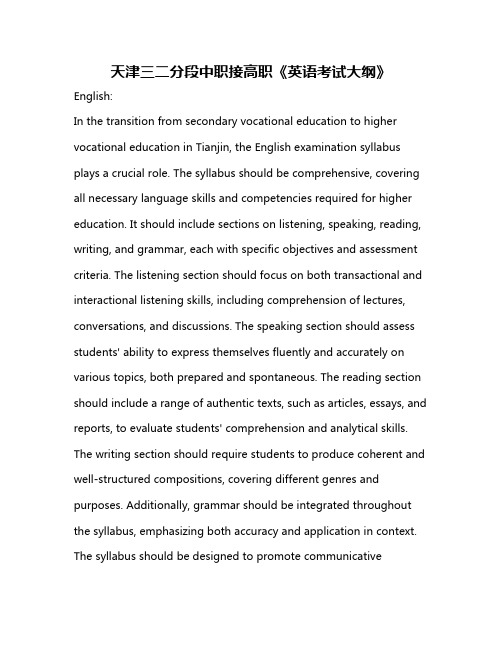
天津三二分段中职接高职《英语考试大纲》English:In the transition from secondary vocational education to higher vocational education in Tianjin, the English examination syllabus plays a crucial role. The syllabus should be comprehensive, covering all necessary language skills and competencies required for higher education. It should include sections on listening, speaking, reading, writing, and grammar, each with specific objectives and assessment criteria. The listening section should focus on both transactional and interactional listening skills, including comprehension of lectures, conversations, and discussions. The speaking section should assess students' ability to express themselves fluently and accurately on various topics, both prepared and spontaneous. The reading section should include a range of authentic texts, such as articles, essays, and reports, to evaluate students' comprehension and analytical skills. The writing section should require students to produce coherent and well-structured compositions, covering different genres and purposes. Additionally, grammar should be integrated throughout the syllabus, emphasizing both accuracy and application in context. The syllabus should be designed to promote communicativecompetence, critical thinking, and lifelong learning skills among students, preparing them effectively for further academic and professional endeavors.中文翻译:在天津中职到高职的过渡中,英语考试大纲发挥着至关重要的作用。
- 1、下载文档前请自行甄别文档内容的完整性,平台不提供额外的编辑、内容补充、找答案等附加服务。
- 2、"仅部分预览"的文档,不可在线预览部分如存在完整性等问题,可反馈申请退款(可完整预览的文档不适用该条件!)。
- 3、如文档侵犯您的权益,请联系客服反馈,我们会尽快为您处理(人工客服工作时间:9:00-18:30)。
天津市高等院校“高职升本科”招生统一考试大学英语考试大纲一、考试性质与目标天津市高等院校“高职升本科”招生统一考试是由合格的高职高专毕业生参加的选拔性考试。
高等院校根据考生的成绩,按照已确定的招生计划,德、智、体全面衡量,择优录取。
因此,考试应该具有较高的信度、效度、适当的难度和必要的区分度。
英语学科旨在考查考生在语言知识、语言技能、情感态度、学习策略和文化意识等素养整合发展基础上的综合语言运用能力,特别是用英语获取信息、处理信息、分析和解决问题的能力以及跨文化交际能力。
二、考试内容与能力要求考生对英语知识和技能的掌握应达到普通高校在校生非英语专业二年级的水平,同时满足进入本科院校继续学习的基本要求。
具体如下:(一)语言知识1. 掌握并能运用基本的语法结构和句型以及所学功能意念和话题(见附录);2. 词汇要求:掌握3500左右常用单词及500左右习惯用语和固定搭配。
(二)语言运用1.阅读能读懂书、报、杂志中关于一般性话题的语篇以及请柬、通知、公告、广告等,并能从中获取相关信息,完成不同的阅读任务。
具体包括:(1)理解、捕捉文中具体信息;(2)根据上下文识别指代关系;(3)根据上下文推断生词的词义;(4)根据所读内容作出简单的推理和判断;(5)理解所读内容的主旨;(6)理解所读内容的篇章结构;(7)理解作者的意图、基本观点和态度;(8)识别不同文体的特征。
2.翻译根据题目要求,完成一般性话题的中英文互译任务。
其中,英译汉部分中,考生应能在正确理解文章内容的基础上将部分句子译成通顺的汉语;汉译英部分中,考生应能在个别英语词汇的提示下将汉语句子译成通顺的英语。
3.写作根据题目要求完成简单的书面表达任务。
考生应能:(1)写出常见体裁的应用文;(2)描述人物或事件,并进行评论;(3)根据文字提纲或图表提供的信息写短文或报告;(4)正确有效地运用所学语言知识,清楚、连贯地传递信息,表达思想,做到语句通顺,结构完整,文体规范。
三、考试方式及试卷结构(一)考试方式考试为闭卷、笔试,试卷满分为150分,考试限定用时为90分钟。
(二)试卷内容、题型及分值试卷分为第I卷和第II卷两部分。
第I卷包含词汇与语法、完形填空、阅读理解三部分,为客观性试题,满分95分;第II卷包含英译汉、汉译英及写作三部分,为主观性试题,满分55分。
具体的题型、题量、分值为:(三)题型说明1.词汇与语法该部分为单项选择题;每小题为一句或两句留有空白的不完整的句子,要求考生在所给的四个选项中,根据特定的语境、语法和词汇知识选出可填入句中空白处的最佳选项。
2.完形填空该部分为单项选择题;为考生提供一篇200-250词左右的英语短文。
文中留出15个空白,文后为每个空白处留有四个可供选择的词或词组,要求考生在通读全文、领会大意的基础上,从备选词或词组中选出一个最佳选项。
3.阅读理解该部分为单项选择题;试卷呈现A、B、C三篇短文,每篇文长300词左右。
题材涉及人物传记、社会历史文化知识、日常生活常识以及科普介绍等。
其中A、B两篇每篇短文后设5个问题,每个问题有四个备选答案,要求考生根据短文内容,选出一个正确答案。
在C篇文章中,文内留出5句空白,文后为5个空白提供7个可供选择的句子,要求考生在通读全文、领会大意的基础上,从7个备选句中选出5个符合文章结构、语意内容及逻辑的选项。
(可参照所附题型示例)4.英译汉该部分为主观性试题;为考生提供一篇200词左右的短文,要求考生在阅读理解的基础上将文内画线的句子翻译成通顺的汉语。
5.汉译英该部分为主观性试题;为考生提供5个独立的中文句子及某些汉字或短语的英文提示,要求考生根据英文表达习惯及相关英文提示词,将中文句子译成通顺的英语。
6.写作该部分为主观性试题;要求考生按照题目要求写一篇不少于100词的英语短文。
题目的呈现方式可以为:中(英)文提纲、图片、图表等。
(四)试题难易比例较容易题约40%中等难度题约40%较难题约20%四、参考书目《天津市高等院校“高职升本科”招生统一考试大学英语复习指南》,天津市教育招生考试院组编,天津人民出版社,2012年版。
五、题型示例Part I. Grammar and Vocabulary (20 points)Directions:There are 15 sentences, each with a blank. Under each sentence, there are four choices marked A, B, C and D. Read the sentences and the choices carefully and then choose the one that best completes the sentence.1. Jack bought ______ useful book. ______ book is also very interesting.A. an; TheB. a; TheC. an; AD. a; A答案: B2. The reason for your failure in the examination is ______ you didn’t work hard enough.A. thatB. whyC. whichD. because答案: APart II. Cloze Test (30 points)Directions: There are 20 blanks in the following passage. For each blank there are four choices marked A, B, C and D. Read the passage carefully and choose the one that fits right into the passage.Men have traveled ever since they first appeared on the earth. In primitive times they did not travel for pleasure but to 1 new places where their herds could feed, or to find more 2 climates. They traveled on foot. Their journeys were long, tiring, and often 3 . They protected themselves with simple tools such as wooden sticks or stone clubs, and by lighting fires at night and, 4 all, by keeping together.Being intelligent and creative, they soon 5 easier ways of traveling. They 6 on the backs of their domesticated animals; they hollowed out tree 7 and, by using bits of woodas paddles, were able to travel across water.Later they traveled, not 8 necessity, but from the joy and excitement of seeing and experiencing new things. This is the main 9 why we travel today.Traveling, of course, has now become a highly organized business. There are cars and splendid roads, express trains, huge ships and jet planes, all of 10 provide us with comforts and security. T h i s s o u n d s w o n d e r f u l, 11 there are difficulties. If you want to go 12 , you need a passport and a visa, tickets, luggage, and many other things. If you lose any of them, your journey may be 13 .Scientists have invented machines that can explore 14 space. Eventually there will be cheap-way excursions to the moon and people will be able to fly from one 15 to another in little arrow-shaped tubes.1. A. visit B. explore C. see D. use2. A. humid B. warm C. cold D. favorable3. A. pleasant B. dangerous C. comfortable D. cheerful4. A. above B. after C. at D. in5. A. gave B. discovered C. changed D. improved6. A. drove B. moved C. ran D. rode7. A. branches B. logs C. trunks D. bushes8. A. for B. with C. from D. without9. A. cause B. reason C. goal D. purpose10. A. that B. these C. which D. those11. A. because B. since C. but D. moreover12. A. outside B. abroad C. inside D. home13. A. hurt B. injured C. spoiled D. destroyed14. A. outer B. out C. extra D. open15. A. continent B. state C. ship D. planet答案: 1. B 2. D 3. B 4. A 5. B 6. D 7. C 8. A9. B 10. C 11. C 12. B 13. C 14. A 15. DPart III. Reading Comprehension (45 points)Directions: There are following three passages. Each passage is followed by several questions or unfinished statements. For each of them there are four choices marked A, B, C and D. Choose the one that fits best according to the information given in the passage you have just read.AThroughout the world, every night children and their elders are “talking” online—many of them are talking at the same time. If you have been joining in the chat room conversations, you might have become one of the millions who write in a special, short form of English.It’s fast: it allows you to talk to six people at once. It’s convenient: you can use three or four words per exchange. It takes cleverness, concentration and quick fingers. And it requires very simple language. There’s neither time nor space for explanations. Why bother to press the keys telling six friends you have to leave for a moment to take care of your little brother whenBRB (=be right back) will do? Want to enter a conversation? Just type PMFJI (=pardon me for jumping in). Interested in whom you’re talking to? Type A/S/L, the common request to know your net pal’s age, sex and location. You may get 15/M/NY as a reply from your pal. If something makes you laugh, say you’re OTF (=on the floor), or LOL (=laughing out loud), or join the two into ROTFL (=rolling on the floor laughing). And when it’s time to get back to work or go to bed, you type GTG (=got to go) or TTYL (=talk to you later).People want to write as fast as possible, and they want to get their ideas across as quickly as they can. Capital(大写的)letters in sentences are left in the dust, except when expressing feelings, as it takes more time to hold down the “shift” key and use capitals. Punctuation (标点)is going, too.1. According to paragraph 1, online chatting allows people in the world to ______.A. learn millions of wordsB. pick out things to buyC. talk at the same timeD. find out funny things2. What does the underlined sentence in paragraph 2 mean?A. People have to communicate in a funny way.B. People have to express themselves in a proper way.C. People have to communicate in a logical way.D. People have to express themselves in a simple way.3. An answer“19/M/HK”to your A/S/L question means ______.A. a 19-year-old boy from Hong KongB. a boy being online for 19 minutesC. being in Hong Kong for 19 monthsD. 19 boys from Hong Kong4. Which of the following is a way to save time when chatting online?A. Using less short forms of English.B. Using less capital letters or punctuations.C. Coming up with ideas as quickly as possible.D. Using the “shift” key when sending e-mails.5. What is this passage mainly about?A. A special form of English online.B. A special form of chatting room.C. A new function of the Internet.D. A new function of computers.答案:1. C 2. D 3. A 4. B 5. ACDirections: Read the following text and choose the most suitable sentence from A-G for each blank. There are two extra sentences which you do not need.Some children think that they go to school just tolearn their mother tongue, English and other foreign languages, mathematics, geography, history, science andthese theonly things they should learn at school?Actually children go to school to prepare themselves for the time when they will be grown up and will have to there is one more There is more to education than just learning facts. We go to school above all to learn how to learn. Learning is not man who really knows how to learn will always be successful because whenever he is faced with a completely new task of problem, he will teach himself how to deal with it in the best way. Therefore, 答案:1. B 2. C 3. A 4. G 5. EPart IV. English-Chinese Translation (15 points)Directions: Read the following passage and then translate the five English sentences marked ①②③④⑤ into Chinese.In every country of the world, there are people who like to collect stamps. Young people and old people, presidents and kings collect stamps. ①It is one of the most popular hobbies in the world.②Stamp collecting started soon after the first stamp was made. Stamp collectors soon began trading stamps with each other. ③They began to buy and sell the ones that were hard to find.Many people collect only stamps with pictures of other places. ④Some collect stamps that come from only one country. Others collect stamps that show only birds or animals. You might collect only stamps that are all the same color.⑤No matter what kind of stamps you collect, stamp collecting can be fun. 答案:1.这是世界上最流行的爱好之一。
